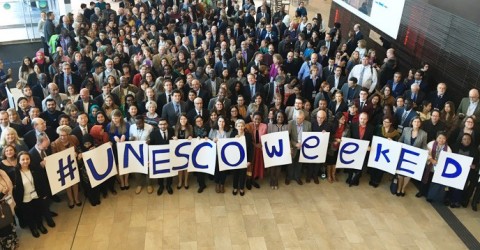
GCED Basic Search Form
Quick Search
أنت هنا
الأخبار

UNESCO Director-General Irina Bokova officially opened the UNESCO Week for Peace and Sustainable Development: The Role of Education in Ottawa, Canada on 8 March together with Catherine McKenna, Minister of Environment and Climate Change, Government of Canada, and Mitzie Hunter, Minister of Education, Government of Ontario.
The 5-day event is gathering more than 400 experts, practitioners and policymakers from across the world to examine pedagogical approaches and teaching practices to achieve the Sustainable Development Goals (SDGs) through Education for Sustainable Development (ESD) and Global Citizenship Education (GCED). Teachers of UNESCO’s Associated Schools Network (ASPnet) are also attending the event, along with 50 young delegates from all around the world.
“We need new forms of education that promotes understanding between cultures, that strengthens the resilience of societies and provides the relevant skills to navigate the future,” said Ms Bokova, emphasizing the need to promote human rights, dignity, diversity and inclusion. “We now have to reinforce efforts, translate results into educational practices, into teacher training and into concrete transformations of curricula. To succeed, we need teachers equipped with the skills and confidence to foster these competences. We must share, analyse and innovate – this is the aim of this Week.”
The Week brings together the Global Review Forum for the Global Action Programme on ESD (GAP) and the Third UNESCO Forum on GCED. ESD and GCED represent UNESCO's two major educational approaches that strive to provide everyone with the opportunity to acquire the knowledge, skills, attitudes and values needed to shape a just, peaceful and sustainable future.
All speakers of the opening acknowledged the important role of women and indigenous knowledge in achieving a sustainable future. “I know the transformative power of education and what it does for my people”, said Maliseet Elder Mac Saulis, who offered a welcome to the traditional territory.
Minister McKenna affirmed that “No change will be more monumental than that of climate change. It won’t be easy to overcome this challenge but it should not be passed on to the generations that follow us.”
Ambassador Dessima Williams, Special Adviser for Implementation of the SDGs, also spoke at the opening on behalf of the President of the Seventy-First Session of the United Nations General Assembly. “There can be no sustained peace without sustainable development”, she said. “The work of UNESCO and its partners are both commendable and encouraging. We cannot do such a job of transforming the world alone, but together, we are able to achieve much.”
Focusing on those who are on the frontlines in the classroom, Fred van Leeuwen, Secretary-General of Education International said: “Teachers create bonds within groups and build bridges across groups and communities. It is clear that efforts to improve teaching and learning will not succeed unless we trust, value and support teachers. We see this Conference as a clear token of UNESCO to support the teaching profession worldwide". ”
Minister Hunter, together with Ms Bokova, inaugurated an exhibition of 42 booths showcasing a wide variety of practices and approaches to ESD and GCED, stating that “for students to achieve excellence, they must be in an environment that enables them to do so.”
The opening was followed by “Talking Across Generations,” an event gathering youth from all regions, policymakers and academics, including several UNESCO Chairs, organized by the UNESCO Mahatma Gandhi Institute for Education for Peace and Sustainable Development (MGIEP). A rich diversity of voices shared views on the 21st century classroom, how to empower teachers to promote peace and global citizenship, use technology and drive transformative change. The Director-General emphasized the importance of support to teachers, through training, professional development, decent salaries and respect for their status in society.
“World Rescue”, an SDG-inspired video game, was launched by MGIEP at the event. It allows players to take the role of young heroes to help solve global problems such as displacement, disease, deforestation and pollution in their communities. UNESCO also presented a new publication “Education for Sustainable Development Goals: Learning Objectives”, which highlights recommendations for classroom activities to address each of the SDGs as well as guidance on how to integrate ESD into policies and teaching.
In support of the Week, the UNESCO Global Education Monitoring (GEM) Report has launched a youth photo contest on ESD and GCED.
The Week will run until 10 March when the GCED Forum examines good policies and practices for educators and teacher trainers to empower learners to become global citizens. Follow the conversation on Twitter under #UNESCOweekED
The UNESCO Week is organized jointly by UNESCO and the Canadian Commission for UNESCO with financial support from UNESCO, the Canadian Commission for UNESCO, the Canada Council for the Arts and the Ministry of Education, Culture, Sports, Science and Technology of Japan through the UNESCO Japanese Funds-in-Trust for ESD. Additional support for the Week is provided by the Council of Ministers of Education, Canada, the Global Centre for Pluralism and the Canadian Museum of History.
